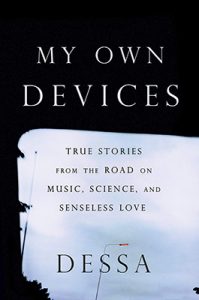
Published by Penguin Random House
My Own Devices, rap artist Dessa’s debut memoir, follows a loose but cohesive chronicle of her introduction into rap music, her growth as an artist and her complicated and fraught relationship with X—another member of her rap group. Each essay in the collection is intellectually gripping—heavy on meaning without bordering on sentimental. In short, Dessa’s prose is in keeping with her rap style—intelligent, considered, and sharp.
In “Up on Two Wheels,” Dessa captures the challenges of being an artist—and being in love—with precision. Her dry and occasionally self-deprecating humor keeps her lyrical prose grounded and relatable as she recounts getting into the rap scene in her twenties—far later than is typically expected—and what it really means to decide to be an artist. Anyone who has considered improbable goals or unstable career paths will recognize themselves immediately when she says “part of the challenge…is that you have to place your bets before you’re fully dealt. You have to assess your talent, still half formed, and decide what you are willing to stake on it.” And then, a moment later: “There’s no best-practice handbook for the pursuit of unlikely dreams.”
My Own Devices is particularly stunning in its ability to appeal not only to fans of Dessa’s music, but also to readers of essay and memoir. The collection is focuses heavily on tales of traveling with Doomtree—the Minneapolis based rap group of which she is a part—and her trouble falling out of love with X, but it would be unfair to call it just the autobiography of a rapper or a story of unrequited love. There’s more to it than that. Stories like “A Ringing in the Ears” about the wooden Woodstock glider her father builds in their garage, and “Slaughter #1” about her mother who, in her sixties, leaves city life and learns to raise cattle, are full of deep consideration about family ties and following dreams. Fans of hers will find that the wordplay and personality they liked in her songs has made it to the page, but it’s a memoir that stands out without knowing anything about Dessa the rapper. It’s relatable and meaningful independently of whether you like—or have heard—her music, though I can easily say I recommend both—Anna Derey-Wilson